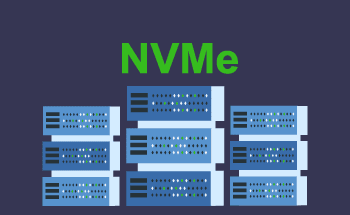VPS or Dedicated Server: understand which is better
13:12, 13.12.2021
There are two types of hosting:
- VPS (virtual private server). This type of server is virtualized at the operating system level. The main disadvantage of VPS is considered to be the dependence on neighbors, especially if the hosting provider uses OpenVZ or Virtuozzo software solutions for virtualization. In these cases, over-selling is possible, when the idle server resources are resold to other clients. This can cause problems with fault tolerance and stability of sites hosted on a VPS.
- A dedicated server is essentially a separate physical machine with fixed hardware capabilities. It is suitable for companies that need a stable and efficient server to run one or more online projects. When renting a dedicated server, one gets full control over the operating system and hardware configuration with guaranteed computing power.
In both cases, the client gets to use a server with a specific configuration, with the ability to create their own versions of system libraries and change the software. In general, the hoster grants access to the system with root-level permissions, that is, without any restrictions. In this article, we will tell you about the differences between a dedicated server and VPS, trying to reveal all the nuances in detail.
Dedicated or virtual: which is better
What is better and what is worse - it is impossible to say without a clear understanding of the purposes for which one needs a server in general.
Dedicated servers provide full control - the owner of it may at his discretion to edit the configuration files, change the software, control panels, and other important parameters.
Owners of VPS have no access to server hardware, that's why this type of hosting is suitable only for small corporate projects and maintenance of remote desktops. The range of applications of dedicated servers is much wider:
- hosting one or more sites with high attendance;
- large databases - in case of force majeure VPS will save access to the database;
- Organization of remote workplaces - a dedicated server can be optimized to store information of different origins, collection of statistics, file processing, analytics, etc.
In general, the dedicated server provides full and independent control and management over the hardware configuration, and it can be used to maintain any online project.
If we compare VPS with a dedicated server directly, we get the following picture:
- VPS has no limit on the number of sites and databases, just like a Dedicated Server. In both cases, everything will depend on the power of the server.
- 2. The level of access to the dedicated server has no restrictions, but in the case of VPS, they are meaning access to the file system and the OS kernel is not provided.
- 3. Dedicated server does not limit possibilities for configuring OS and web panel, and in the case of VPS most often there are restrictions, and you have to choose from those options that a VPS-hoster offers.
- 4. On a Dedicated server over-selling is impossible, you get full access to the server capacity, and no one under any circumstances will be able to claim your computing resources. But for virtual servers, it is possible with virtualization using OpenVZ and Virtuozzo software solutions. If virtualization is performed using KVM or XEN VPS, then over-selling is inexpedient.
- 5. The hosting provider is responsible for ensuring the hardware stability of the server in both cases, everything is the same here.
As you can see, a dedicated server offers a much higher level of control and provides more opportunities compared to VPS. These two types of hosting (https://hostzealot.com/shared) differ in all key parameters, from architecture and administration to security and fault tolerance. These aspects must be dealt with in detail.
Server architecture
A dedicated server has an extremely simple architecture - it is a separate physical machine, which owns the hoster and which he fully leases to the client. There are no pitfalls, everything is very simple and clear.
With virtual servers, it's more complicated. For ease of understanding, imagine a big pie is our physical machine housed in some large data center. This pie is big, and one person can't eat it by himself, so the hosting provider takes a knife and slices it into many pieces.
The knife is one of the popular virtualization technologies. In our case, it is KVM - Kernel-based Virtual Machine. KVM provides the highest level of privacy and guarantees the independence of VPS resources from each other. Simply put, such VPS in characteristics and capabilities will be as close as possible to the dedicated servers. So, the pie is sliced into several pieces of different sizes.
Of course, VPS is much cheaper than renting dedicated servers, so they are ideal for hosting small sites and projects that are in the initial stage of development. A dedicated server is an expensive option for companies who are willing to invest solid money in a stable and powerful server infrastructure with the highest level of fault tolerance.
Performance comparison
In terms of capacity allocation mechanism, a virtual private server is closest to standard shared hosting. In both cases, the servers are located on the same physical machine. The difference is that the VPS tenant has full control over the rented capacity, and on shared hosting resources are shared according to "who needs it most" or "first-come, first-served" principle.
When you rent a VPS, you own all your power, just as you do with dedicated servers. But that's assuming that your hosting provider isn't overselling. As we mentioned above, HostZealot utilizes a KVM software solution for VPS virtualization which excludes the possibility of over-selling. This allows us to guarantee our customers the inviolability of the leased capacity.
As for the dedicated server, the customer gets a separate physical machine with all its resources. But if in the case of VPS the hardware is divided into several parts, here you get the sole access to the hardware resources. Hence the higher performance, stability, and fault tolerance.
In both cases, the client can choose the tariff with a certain server configuration. The number of processor cores, the amount of RAM, disk space - all this is stipulated in advance. For projects with an extremely high load, it is better to use a dedicated server, because the performance, all other things being equal, will be higher.
Administration
Virtual VPS server provides an extensive set of tools for administration:
- installation of any software;
- ability to change settings - including system configuration files;
- choosing any control panel;
- ability to install different operating systems - including our own assembled distributions, but in this case, you will need to provide a ready-made image;
But with all this control of the virtual server administrator has its limits. For example, the mechanism of resource allocation of the entire server is under the control of the hoster. In addition, as we noted earlier, clients do not get access to the Linux operating system kernel or Windows Server.
With dedicated servers the situation is different. In this case, the client has a completely empty machine with which it can do whatever it wants. Instead of traditional Linux, you can use FreeNAS or Windows. You can build your own distribution and install it. You can change the file system and even make adjustments to the operating system kernel - no one and nothing limits you. To put it simply, renting a dedicated server gives you 100% control over the hardware and software on your machine. But this freedom has to be used wisely, so you will need an experienced specialist for the administration, who will be able to install the operating system, control panel, set up the required number of remote desktops, secure the server, etc. More administration is more responsibility.
Security level
There are no major differences in terms of security between VPS and dedicated servers. In both cases, security falls on the clients themselves, so after renting, you will need to find a specialist who will set up two-factor authentication, close all third-party ports, install and prepare for Fail2ban, set up backup creation, etc.
Separately, it is worth mentioning the physical protection of servers, as this task is entrusted to the specialists of the data center where the equipment is located. We cooperate only with the best data centers around the world, which guarantee our customers the highest level of security and fault tolerance.
Pricing policy
A virtual server was, is, and will be a much more affordable option than renting a dedicated server. As we mentioned earlier, VPS provides our customers with much less features and hardware capacities of these servers are lower compared to a dedicated server.
HostZealot offers a large selection of affordable rates of different levels with a choice of convenient geolocation:
- Seattle (USA);
- Stockholm (Sweden);
- Tallinn (Estonia);
- Amsterdam (Holland);
- Hong Kong (China);
- Toronto (Canada);
- Warsaw (Poland) and many others.
You can find a complete list of all available locations on our website.
Conclusion
So, if you need the most productive, stable, and reliable hosting, it is better to choose a dedicated server. Yes, it's more expensive to lease, but there is no other choice for big projects because it's the only way to get 100% control over the software and hardware of the server.
VPS - a suitable option for small projects, this type of hosting is often used the placement of online stores, websites, or organizations of remote workstations. Virtual private servers are well scalable and due to virtualization with KVM guarantee a high level of security for customers. If you need additional advice, please contact our experts in any convenient way.


